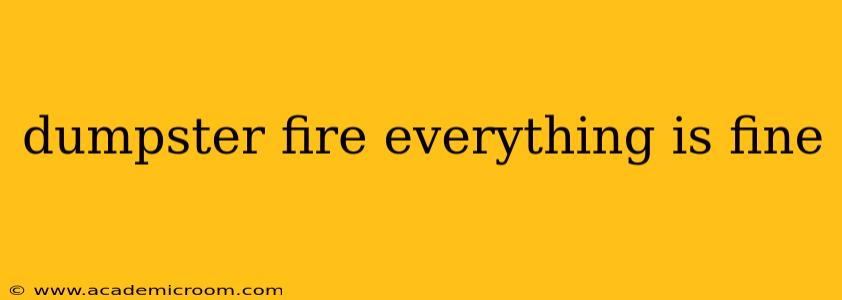Decoding "Dumpster Fire, Everything is Fine": Irony, Sarcasm, and the Art of Controlled Chaos
The phrase "dumpster fire, everything is fine" has become a ubiquitous internet meme, representing a potent blend of irony, sarcasm, and dark humor. It perfectly captures the feeling of utter chaos masked by a veneer of forced positivity. But what makes this phrase so resonant, and what does it actually mean? Let's delve into the nuances of this seemingly contradictory statement.
What does "dumpster fire" mean?
The term "dumpster fire" itself is a vivid metaphor for a complete and utter disaster. It conjures images of uncontrolled flames, smoke, and the pervasive smell of burning refuse – essentially, a scene of utter pandemonium. It signifies a situation spiraling out of control, riddled with problems, and generally heading toward catastrophic failure.
What does "everything is fine" mean in this context?
The juxtaposition of "dumpster fire" with "everything is fine" is where the real magic (or perhaps, the dark humor) lies. The phrase "everything is fine" is clearly not meant to be taken literally. Instead, it's a sarcastic and often ironic understatement, highlighting the stark contrast between the reality of the situation and the outward projection of calm. It suggests a deliberate attempt to downplay or ignore a serious problem, often out of fear, denial, or a desperate need to maintain a sense of control in a chaotic situation.
What are some examples of situations where this phrase applies?
This phrase is incredibly versatile and can be applied to a wide range of scenarios, from personal struggles to global events. Think:
- A disastrous work project: The deadline looms, the code is buggy, and the client is furious, yet the project manager assures everyone, "Everything is fine!"
- A personal crisis: A relationship is crumbling, finances are strained, and life feels overwhelming, but the individual insists, "Dumpster fire, everything is fine!"
- A chaotic household: The kids are screaming, the dog is chewing on furniture, and dinner is burnt, but the parent manages a strained, "Everything is fine!"
In each case, the phrase reveals a disconnect between reality and outward presentation, highlighting the absurdity of trying to maintain a facade of normalcy amidst utter chaos.
Why is this phrase so popular?
The phrase's popularity stems from its relatability. We've all experienced situations where everything seems to be falling apart, yet we feel pressured to project an image of calm and composure. The meme allows us to express this shared experience with a degree of dark humor and self-awareness. It's a way of acknowledging the absurdity of the situation without having to engage in lengthy explanations or emotional outbursts.
Is it always negative? Can it be used humorously?
While often used to express frustration and despair, the phrase can also be used humorously, especially among friends who understand the shared context and irony. It can serve as a bonding experience, acknowledging the shared human experience of navigating chaotic situations. The humor lies in the recognition of the absurd contrast between the grim reality and the deceptively positive statement.
In conclusion, "dumpster fire, everything is fine" is more than just a meme; it's a cultural phenomenon reflecting our collective experience of navigating chaos and maintaining appearances. Its enduring popularity speaks to its ability to capture a universal truth with both dark humor and poignant accuracy.
